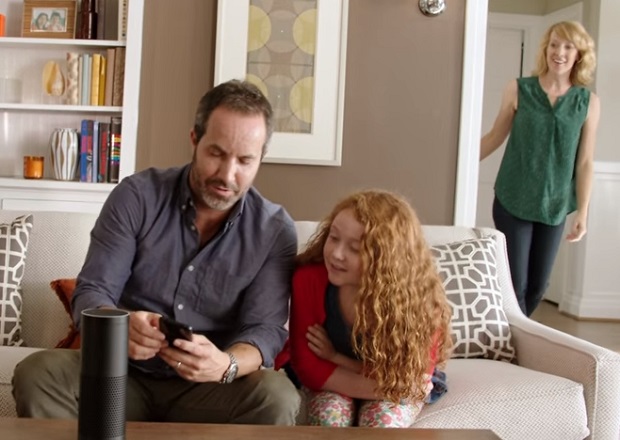Consumers plan to shop online this Christmas and are prepared to embrace new AI-powered technologies such as Amazon Echo and Google Home, according to new research.
The study, from Accenture, indicates that despite concerns around Brexit, spending on Christmas purchases is likely to increase in the U.K. this year, with more than a third (37 percent) of consumers planning to spend more than they did last year, according to the latest Accenture Holiday Shopping Survey.
Now in its fourth year, the survey examined the buying intentions of 1,500 consumers across the U.K. While 61 percent of respondents said that Brexit has affected their spending habits in some way, 89 percent plan to spend the same or more this festive season than they did last year.
The findings also suggest that the convenience of online shopping will play a vital role in driving Christmas sales, as the single biggest boost to spending, with 40 percent of respondents saying it will have a positive impact – more than double the number who said that a good in-store experience (18 percent) will have a positive impact. Overall, 81 percent of consumers plan to do their shopping online, with 79 percent checking Amazon before looking or buying elsewhere.
Consumers are also prepared to experiment more with new and AI-powered technologies. The survey found that significant numbers of U.K. shoppers are now familiar with mobile payments at the checkout (88 percent of respondents), voice commerce services like Amazon’s Alexa (81 percent) or Google Home (67 percent), chatbots (46 percent), and even virtual mannequins to see what clothes look like before they buy (34 percent).
More than a quarter (28 percent) of respondents said they would actively choose drone delivery over other delivery options if it were offered, both because it is easier than collecting in store and because they see drones as cool and exciting. The research found that while shoppers of all ages are embracing newer technology, older millennials, aged 28-37, are the most likely to embrace it.
“Our research shows that AI-powered technology is an increasingly familiar feature of everyday life,” said Jill Ross, a managing director in Accenture’s UK Retail practice. “As AI and the internet of things make online shopping easier, customers are increasingly likely to purchase ‘commodity’ items, such as shampoo, through their connected devices. But while technology can help drive sales, true differentiation will come from a clearly defined brand purpose that builds trust with a customer. Retailers that understand when their customer wants to interact with AI and when they are looking for the human touch will be the ones to win the sale.”
As more consumers use technology for the bulk of their Christmas purchases, the security of personal information remains a concern. Half of respondents said they are worried about the safety of their data when making online purchases, and 59 percent said that this affects the brands from which they choose to buy. This comes as retailers prepare for the General Data Protection Regulation (GDPR) in May 2018, the most significant change to data protection and security regulation in the EU in more than a decade. While the implementation of the GDPR is an opportunity to boost consumer trust and increase consumers’ willingness to share personal data, more than two-thirds (68 percent) of survey respondents are not aware of the GDPR changes or what they mean.
“Under GDPR, retailers will face new requirements that will compel them to completely review their approaches to customer privacy and rethink the value exchange,” Ross said. “The attitude of ‘If I give you consent this is what I will get in return’ will start to drive how consumers think about sharing and how they select the brands they share with. To build trust, retailers need to be transparent and responsible about the use of customer data, using it in a way that clearly provides a better experience or more value. Establishing processes that ensure that each new data-related activity is acceptable will be a crucial element of future data innovation.”
Other key findings of the survey:
• ‘Experience’ gift purchases will likely increase. One-third (33 percent) of respondents said they are likely to spend more on ‘experience’ gifts — such as for restaurants, cooking classes, travel, and concert and theatre tickets — than they did last year.
• An unexpected crisis is more likely than any other factor to affect consumers’ spending. An unexpected crisis is the main factor likely to reduce consumers’ Christmas shopping spend this year, cited by more than one-third (38 percent) of survey respondents. Other factors likely to reduce consumer spending are rising food prices (cited by 32 percent), overall inflation (27 percent) and higher home energy bills (26 percent).
• Retailers could benefit by providing shopping ideas. More than four in 10 shoppers said their shopping experience would be made easier if they could get gift ideas for special occasions and people they don’t regularly shop for (cited by 42 percent of respondents) and by the provision of online wish lists (44 percent).
“The most innovative retailers with a clear brand purpose balance human understanding and sensibility alongside digital prowess,” Ross said. “They are starting to streamline search capabilities and curate the experience to help customers choose what to purchase by offering these services for two distinct purposes: helping customers find what they are looking for, and helping customers find things they don’t yet know they’re looking for.”
Methodology
The Accenture Holiday Shopping Survey offers insights into consumer buying patterns during the Christmas holiday season, providing an indication of retail performance expectations both on the high street and online at a key time for the retail sector. For this year’s study, Accenture queried a representative sample of 1,500 U.K. consumers online in September and October 2017.
